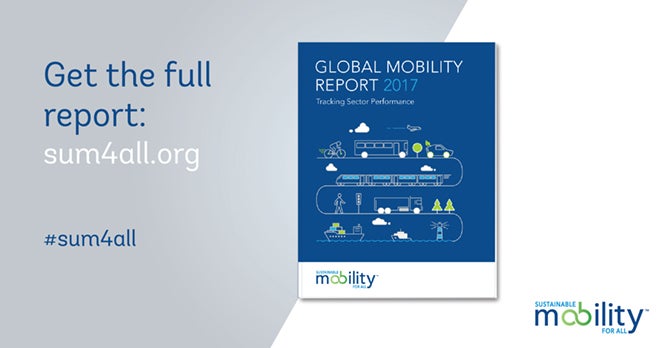
That is the verdict of the Global Mobility Report (GMR)—the first ever assessment of the global transport sector and the progress made toward achieving sustainable mobility.
This is the first major output of the Sustainable Mobility for All initiative (SuM4All), a global, multi-stakeholder partnership proposed last year at the United Nations (UN) Climate Action Summit with the purpose of realizing a future where mobility is sustainable. The release of this study puts a sector often overlooked by the international community squarely on the map as essential to address inclusion, health, climate change and global integration.
The report defines sustainable mobility in terms of four goals: universal access, efficiency, safety, and green mobility. If sustainable mobility is to be achieved, these four goals need to be pursued simultaneously.
To measure progress, the study proposes a Global Tracking Framework (GTF) that covers existing targets and relevant transport-related indicators, including those already identified as part of the Sustainable Development Goals (SDGs). This responds to the call by the UN Secretary-General’s High Level Advisory Group on Sustainable Transport’s report Mobilizing Sustainable Transport for Development, which highlights the need for a strong monitoring and evaluation framework to track progress in the sector.
According to the Global Mobility Report, unless action is taken by all transport stakeholders, the costs for increased mobility in terms of social exclusion, accidents, inefficiencies, and pollution are simply too high. For the first time, a report pulls together the global evidence and data, looking at the sector comprehensively and measuring the extent to which investments and policies go in the right direction.
Some of the key findings of the report include:
- Universal Access: approximately 450 million people in Africa—or more than 70% of its total rural population—are estimated to have been left unconnected to transport.
- Efficiency: transporting a container of avocados from Kenya to the Netherlands requires 200 interactions and more than 20 documents, at a cost equal to that of shipping. Efficient supply chains can increase farmers’ income by 10-100%.
- Safety: almost 1.3m people die on the world’s roads every year and tens of millions are seriously injured. Traffic crashes are the leading cause of death among young people aged 15-29.
- Green Mobility: Transport emits 23% of all energy-related greenhouse gases; its CO2 emissions could grow by 40% by 2040.
There is no doubt that the future of mobility will have serious consequences for the well-being of people and the planet. The stakes involved in meeting the mobility demands of tomorrow are far too great to be ignored, especially given its central importance to eradicating poverty and promoting sustainable development. The Global Mobility Report can be a fundamental tool to help achieve this goal.
It is this urgency that galvanized the establishment of the SuM4All initiative and the work it is now undertaking. Over 50 leading organizations are already part of the initiative, including bilateral donor organizations, United Nations agencies and regional commissions, Multilateral Development Banks, the private sector, non-governmental organizations, global civil society organizations, and academic institutions—all committed to speaking with one voice, acting collectively to implement the SDGs, transform the transport sector and ultimately moving the world a long way down the road to sustainable mobility.
Learn more:


Join the Conversation